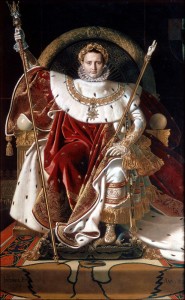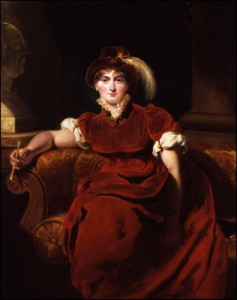All links are to Wikipedia entries.

Napoleon on his Imperial Throne by Jean Auguste Dominique Ingres. (Click on image to see a larger version.)
Government, Politics, and War:
- February: A royalist conspiracy against Napoleon is uncovered.
- March 21: The Napoleonic Code is adopted as French civil law.
- March: One of the royalist conspirators, Louis-Antoine-Henri de Bourbon-Condé, duc d’Enghien, is seized, condemned by a commission acting under Napoleon’s orders, and shot, ending any hope of a reconciliation between the emperor and the royal house of Bourbon. The young duke’s murder is discussed in the opening of Tolstoy’s War and Peace.
- April: Another of the royalist conspirators, General Charles Pichegru is found strangled in his cell at the Temple prison. It was rumored, but never proven, that his murder was ordered by Napoleon.
- May 10: William Pitt once again becomes Britain’s Prime Minister after the resignation of Henry Addington.
- May 18: Napoleon is proclaimed Emperor of the French by the French Senate.
- December 2: Napoleon crowns himself Emperor of France at Notre Dame Cathedral in Paris.
- December 12: Spain declares war on Britain.
Society and Social History:
- February 12: German philosopher Immanuel Kant dies at age 79.
- March 7: The Royal Horticultural Society is founded.
- August: Alice Meynell becomes the first female jockey in England.
Literature, Journalism, and Publishing:
- Maria Edgeworth publishes Popular Tales.
- William Blake publishes Jerusalem: The Emanation of the Giant Albion.
Art, Architecture, and Design
- The Society of Painters in Water Colours is founded by artists who do not believe their medium commands enough respect by the Royal Academy.
- Thomas Lawrence paints a Portrait of Caroline of Brunswick, Princess of Wales.
- October 29: George Morland, English painter of animals and rustic scenes, dies at age 41.
Music:
- December: Beethoven angrily renames his Third Symphony from the Napoleon to the Eroica after Napoleon crowns himself emperor.
Theater and Dramatic Arts:
- March 17: First performance of Friedrich Schiller‘s play Wilhelm Tell, at Weimar under the direction of Johann Wolfgang von Goethe.
Science and Industry:
- Gas lighting is demonstrated at London’s Lyceum Theatre by German inventor Frederick Albert Winsor.
- Morphine is first isolated from the opium poppy by the German pharmacist, Friedrich Sertürner.
- February 21: Richard Trevithick designs and demonstrates the first steam-powered railway locomotive.
Natural History and Exploration:
- April 5: The first recorded meteorite falls in Possil, Scotland (High Possil meteorite).
- May 14: The Lewis and Clark Expedition departs from Camp Dubois and begins their historic journey by traveling up the Missouri River.





